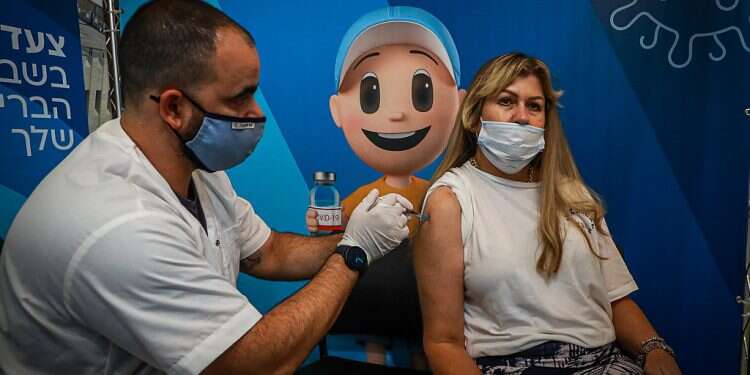Less than a month into a COVID-19 vaccine booster drive, Israel is seeing signs of an impact on the country's high infection and severe illness rates fuelled by the fast-spreading Delta variant, officials and scientists say.
Follow Israel Hayom on Facebook and Twitter
Delta hit Israel in June, just as the country began to reap the benefits of one of the world's fastest vaccine roll-outs.
With an open economy and most curbs scrapped, Israel went from single-digit daily infections and zero deaths to around 7,500 daily cases last week, 600 people hospitalized in serious condition and more than 150 people dying in that week alone.
On July 30, it began administering a third dose of the Pfizer/BioNtech vaccine to people over 60, the first country to do so. On Thursday it expanded eligibility to 30-year-olds and up whose second dose was given at least five months prior, saying the age may drop further.
In the past 10 days, the pandemic is abating among the first age group, more than a million of whom have received a third vaccine dose, according to Israeli Health Ministry data and scientists interviewed by Reuters.
The rate of disease spread among vaccinated people age 60 and over began falling steadily around Aug. 13 and has dipped below 1, indicating that each infected person is transmitting the virus to fewer than one other person. A reproduction rate of less than 1 means an outbreak is subsiding.
Scientists said booster shots are having an impact on infections, but other factors are likely contributing to the decline as well.
"The numbers are still very high but what has changed is that the very high increase in the rate of infections and severe cases has diminished, as has the pace at which the pandemic is spreading," said Eran Segal, a data scientist at the Weizmann Institute of Science and an adviser to the government.
"This is likely due to the third booster shots, an uptake in people taking the first dose and the high number of people infected per week, possibly up to 100,000, who now have natural immunity," Segal said.
Israel appears poised to break its previous record for confirmed daily cases, according to Health Ministry data released Tuesday. Of the 157,994 people who tested for the virus Monday, 9,831 were found to have the disease. Israel confirmed its highest number of new cases, 10,118, back in January 2021. Over one million people have been infected since the beginning of the pandemic.
The infection rate stands at 6.63%. The reproduction rate, which relates to the number of people each confirmed carrier infects, is 1.19.
The country has 72,572 active cases of the virus. There are 678 people in serious condition, 123 of whom are on ventilators.
Although 925,941 people have recovered from the virus, 6,864 have died.
Among those Israelis eligible for the coronavirus vaccine, fewer than 1 million – around 978,000 – have yet to get the jab.
Infections have spiked in the Haredi community since students in the community returned to schools on Aug. 9, according to ministry data. At around 4% at the start of the new school year, the community's infection rate was comparable to that of the general population at the time. In just two weeks, that rate has nearly tripled to 11.48%, while the infection rate in the general population now stands at around 5%. The rapid increase in infections comes despite community members having been found to possess higher antibody levels than the general population officials believed might make them less susceptible to infection.
In an interview with Army Radio Tuesday, coronavirus cabinet member and Housing and Construction Minister Ze'ev Elkin said: "The increase in seriously ill patients is much slower, but this is a kind of illusion. The experts said it is clear those who got the third vaccine dose are less at risk of becoming seriously ill, but if we don't succeed in stopping the new infections –– the number of patients in serious condition will continue to climb."
Former Health Ministry Director-General Hezi Levy called lockdown "a doomsday device" in an interview with Army Radio Tuesday.
"I don't think we need to get there. I doubt it will do what we need it to do. The people are tired, and we cannot be sure people will abide by the guidelines," he said.
Meanwhile, Health Minister Nitzan Horowitz announced the government would now offer at-home vaccinations alongside the addition of hundreds of medical workers in an effort to rein in morbidity levels.
Meanwhile, the government updated its blacklist of countries Israelis are barred from visiting, Monday, so that it now includes Bulgaria, Brazil, Mexico, and Turkey. Georgia and Spain were removed from the list.
Also on Monday, the US Food and Drug Administration gave full approval to Pfizer's COVID-19 vaccine, potentially boosting public confidence in the shots and instantly paving the way for more universities, companies, and local governments to make vaccinations mandatory.
Hundreds of millions of Pfizer doses have been administered worldwide since the FDA approved the vaccine for emergency use in December. In going a step further and granting full approval, the FDA cited months of real-world evidence that serious side effects are extremely rare.
US President Joe Biden said that for those who hesitated to get the vaccine until it received what he dubbed the "gold standard" of FDA approval, "the moment you've been waiting for is here."
Pfizer said the US is the first country to grant full approval of its vaccine, in a process that required a 360,000-page application and rigorous inspections. Never before has the FDA has so much evidence to judge a shot's safety.
The formula, jointly developed with Germany's BioNTech, will be marketed under the brand name Comirnaty.
Moderna, whose vaccines Israel also acquired, has also applied to the FDA for full approval of its vaccine.
Subscribe to Israel Hayom's daily newsletter and never miss our top stories!




